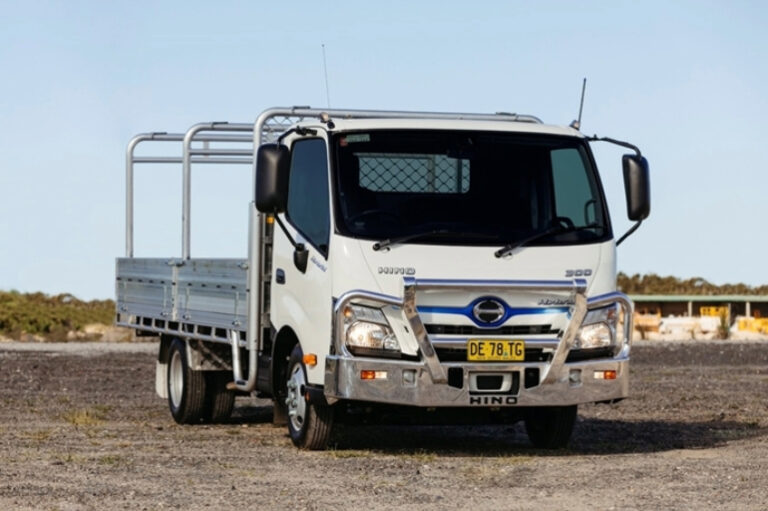Craig Humphreys recently stepped into a prominent role at Hino after years of dedication and hands-on experience in the truck and automotive industry. His career journey showcases a natural progression from working as a motor mechanic to a pivotal leadership role, with deep expertise in fleet management, government sales, and hybrid truck technologies.
A career built on practical experience
Craig’s path to his current role has been marked by continuous growth across several key areas. He started his career as a motor mechanic, but his ambitions soon led him to the aftermarket spare parts industry. From there, Craig transitioned to the truck industry, working with CMV Group, Volvo, and Hino, where he gained invaluable insights from the coalface of the industry.
His seventeen years within the transport industry were transformative, as he witnessed and contributed to significant industry shifts. Eventually moving into sales, where he took on government fleet sales. Over the years, Craig has consistently proven his ability to adapt, leading to his appointment as a Sales Manager for six years before recently stepping back into government and fleet sales.
When the opportunity arose to take on a senior role with the retirement of Tom Aryton, Craig applied and transitioned from “dealer land into factory land,” as he describes it.
Evolving customer demands
Craig’s extensive experience has given him a unique perspective on how customer demands have evolved, particularly within the fleet and government sectors. While the fundamentals of the truck industry have remained the same—delivering reliable vehicles for business purposes—Craig notes that safety and emissions have become critical focal points over the last decade.
“Safety and emissions are at the forefront now, but it’s still primarily an asset for a business,” says Craig. This evolution reflects growing environmental concerns, with many fleet managers now considering CO2 offsets and safety packs as essential parts of their decision-making process.
Craig emphasises that while some aspects of customer needs have remained consistent, there is a rising awareness of the environmental impact of trucks, especially in urban areas.
The role of hybrid technology
Craig has had a front-row seat to the growing discussion around hybrid vehicles, particularly Hino’s Hybrid Electric trucks, which have been on the market for a considerable time. He believes that customer sophistication around hybrid technology has increased, especially since the onset of COVID-19, with more businesses now focusing on emission savings and CO2 output.
With hybrid technology becoming more commonplace in cars, many now view it as the standard. However, in the trucking industry, the adoption of hybrid vehicles is still catching up.
Craig sees hybrid trucks as the vital “next step” in reducing emissions while maintaining operational efficiency, especially given the current limitations of infrastructure for fully electric and hydrogen-powered vehicles. According to him, hybrid technology provides a solution that fits neatly between diesel trucks and the goal of zero emissions, allowing businesses to reduce their carbon footprint without sacrificing profitability.
Impact of hybrid trucks on fleet efficiency
For fleet managers, the appeal of hybrid trucks is more than just environmental. Craig notes that Hino’s hybrid trucks can offer up to a 20% reduction in fuel consumption, which has a significant impact on the bottom line for businesses.
“It’s a win-win. You’re helping the environment while also remaining profitable and completing your job,” Craig says. This balance between sustainability and business efficiency is what makes hybrid trucks such an attractive option for many fleet managers.
Government and private sector adoption
Craig believes that hybrid technology has found strong support among local governments and councils, particularly those with green initiatives and emissions targets. These organisations are increasingly looking for solutions that allow them to meet their environmental goals while still delivering essential services.
Interestingly, Craig also points out that the private sector, including smaller businesses and individual operators, is beginning to embrace hybrid trucks more than ever before. “Five years ago, they didn’t really care,” he says. “But now, with rising fuel costs and increased awareness of environmental issues, more people are considering hybrid options.”
A vision for the future
Looking ahead, Craig envisions a future where hybrid trucks play a crucial role in bridging the gap between diesel-powered fleets and fully zero-emission vehicles. While infrastructure challenges remain a barrier to widespread adoption of electric and hydrogen trucks, hybrid technology offers a viable, immediate solution.
With his vast experience and forward-thinking approach, Craig Humphreys is well-positioned to lead Hino’s efforts in promoting hybrid technology as the industry adapts to a more sustainable future.
Fleet managers, local governments, and businesses alike will benefit from his insights and the proven benefits of Hino’s hybrid trucks, making Craig Humphreys a name to watch as the trucking industry navigates its path toward greater sustainability.






